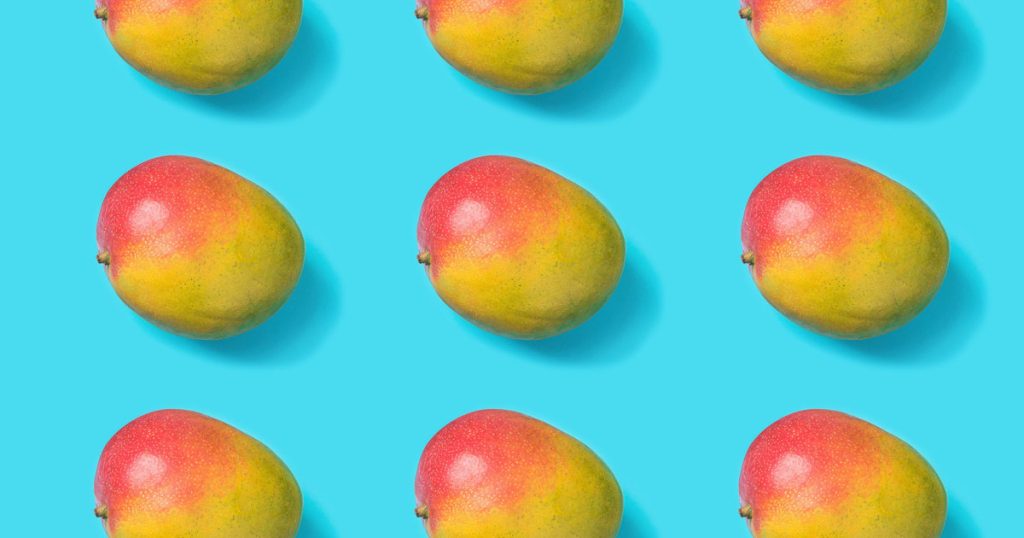Summarize this content to 2000 words in 6 paragraphs Mango is so popular, nutritious and widely eaten around the world that it’s been called the “king of fruits.” Sweet and juicy, the vibrant yellow flesh is delicious on its own, made into nectar or juice, added to a smoothie or turned into a dried snack.Each bite also provides important vitamins, nutrients and a key type of fiber, says Sarah Rivenburgh, a registered dietitian at OhioHealth who specializes in oncology nutrition.“One of the things I really like about mango is that it is high in soluble fiber. A lot of fruit has fiber in it, but mango specifically has soluble fiber, which can be really good because it forms a gel in our digestive tract,” Rivenburgh tells TODAY.com.“It can actually bind the fat and cholesterol and pull it out of your body before it gets absorbed into the bloodstream.”Registered dietitian Samantha Cassetty includes mangoes on her list of the 15 healthiest fruits because of their carotenoid compounds, which give mangoes their golden color and provide health benefits.And high profile fans include actor Kevin Bacon, who likes to start his day with a spicy “morning mango.”Mango nutrition:One cup of mango cut into pieces contains the following, according to the U.S. Department of Agriculture:99 calories1.3 grams of protein25 grams of carbohydrates2.6 grams of fiber22 grams of sugarThe fruit has no cholesterol and virtually no fat. It contains calcium, iron, copper, magnesium, potassium, folate and lycopene.One cup of mango provides 67% of the recommended daily value of vitamin C. This essential nutrient and antioxidant can’t be made by the body but is important for collagen production, a key component of skin health, and its role in supporting the immune system, dietitians previously told TODAY.com.In addition, one cup of mango contains 10% each of vitamin A and vitamin E you need for the day, Rivenburgh says.What are the benefits of eating mango?Besides helping to lower cholesterol levels, the gel formed in our digestive tract by the soluble fiber in mangoes is good for gut health and regular bowel movements, and can have an anti-diabetic effect, Rivenburgh notes.“It helps move waste through your system and it can help with constipation,” she says.“Anytime food has a higher fiber content, it means the body is going to digest a little bit slower and therefore you may not see spikes in your blood sugar as much.”Fiber can also help people feel full longer, which can prevent overeating and help with weight loss. That, in turn, leads to a healthy body weight, which decreases the risk for diabetes, cancer and heart disease, Rivenburgh adds.Women who eat a diet rich in fiber may have a lower risk of breast cancer, a 2020 review of studies found.Mangoes are a good source of carotenoids, pigments that give fruits and vegetables their red, yellow or orange colors and act as antioxidants. Women who eat a diet with lots of carotenoid-rich fruits and vegetables are at reduced breast cancer risk, a study published in The American Journal of Clinical Nutrition found.Two carotenoids in mango — lutein and zeaxanthin — also promote better vision, Cassetty notes.The fruit is a rich source of strong antioxidants found in plants known as polyphenols, and one of those, mangiferin, is only found in mango, Rivenburgh adds.Antioxidants help neutralize the damage caused by free radicals — harmful particles generated when the body performs regular processes needed for life. This damage can lead to inflammation and may increase the risk of cancer and other diseases, the National Cancer Institute notes, but antioxidants can protect cells from it.It’s been proposed mangiferin has anti-cancer benefits, but there aren’t enough human studies to be able to say for sure, Rivenburgh notes.She likes that mango is a good source of potassium, too.“It’s really important for the American population because we tend to eat too much sodium and not enough potassium, and that’s where we get a lot of high blood pressure,” Rivenburgh notes.“If we can decrease the sodium in our diet and eat more potassium-rich foods like mango, it can help lower that blood pressure.”The potassium, fiber and other nutrients mango’s packing help reduce the risk of heart disease, the American Heart Association says, calling the fruit “a nutritional hero.”What’s the best way to eat a mango?Fresh is wonderful and gives you a lot of different ways to eat it — whether plain, in a salsa or added to a yogurt parfait, Rivenburgh advises.Cooking foods with carotenoids can help increase their availability, or make them more easily absorbed by the body, so Rivenburgh suggests trying recipes where you cook mango.If you enjoy dried mango, check the ingredients lists to make sure it doesn’t include any added sugar.“I always say whichever way you like (mango) is probably the best way to eat it, because you’re going to be able to eat more of it that way,” Rivenburgh notes.
Keep Reading
Subscribe to Updates
Get the latest creative news from FooBar about art, design and business.
© 2026 Globe Timeline. All Rights Reserved.













